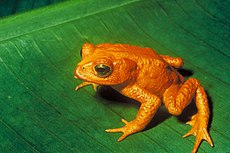Endangered species
An endangered species is a group of animals or plants which is threatened by becoming extinct. This could happen because there are few of that animal left, its predators have grown in number, or the climate that it lives in is changing, or the places it lives in have been destroyed.

| Conservation status | |
|---|---|
 | |
| Extinct | |
| Threatened | |
| Lower Risk | |
Other categories | |
| |
Related topics | |
 Comparison of Red list classes above and NatureServe status below  | |
The World Conservation Union (IUCN) has worked out that endangered species are 40% of all organisms.[1]
How to get rid of endangered species
changeMany countries have laws to protect these plants and animals. These laws, if obeyed, can save species by stopping hunting, land development or making parks and reserves. Poaching and other illegal activities, however, can still destroy them.
Only a few plants and animals at risk of extinction, mostly vertebrates, are put on the lists and get legal protection. Many more species become extinct, or will become extinct, without people knowing about it.
Mammal
changeThis is a list of some mammals that are endangered. They include:
- Asiatic linsang
- Asiatic lion
- Black-footed ferret
- Black rhinoceros
- Blue whale
- Dhole
- Ethopian wolf
- Hairy-eared dwarf lemur
- Indonesian mountain weasel
- Snow leopard
- Tiger[2][3]
- White rhinoceros [4] (currently considered as near endangered)
Birds
changeEndangered birds include:
Related pages
changeFurther reading
changeReferences
change- ↑ "IUCN Red-list statistics (2006)". Archived from the original on 2006-06-30. Retrieved 2010-07-17.
- ↑ "Black Rhino | Species | WWF". World Wildlife Fund. Retrieved 2020-04-30.
- ↑ "Why Are Rhinos Endangered". www.helpingrhinos.org. Archived from the original on 2020-04-09. Retrieved 2020-04-30.
- ↑ "After Last Male's Death, Is the Northern White Rhino Doomed?". National Geographic News. 2018-03-20. Retrieved 2020-04-30.